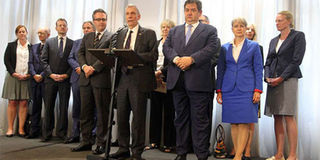Premium
Western diplomats should be our friends and allies not enemies

American Ambassador to Kenya Robert Godec leads other diplomats during a press conference. As the national debate continues to unfold, there is little doubt diplomats from all over the world will continue to play a very important role.
FILE PHOTO | NATION MEDIA GROUP
What you need to know:
The envoys had demanded opposition to recognise President Uhuru Kenyatta as validly elected.
Debate about criticism between Kenyans, diplomats, government and opposition is as old as independence, if not older.
Having come to the side of democracy, western diplomats are no longer our enemies but friends.
With the agreement between President Uhuru and Raila Odinga to work together on the needs and changes that Kenya must have with help of much support from US and western diplomats, parts of the opposition had accused western diplomats of prejudice against it and burnt American flag near the US embassy.
As the national debate continues to unfold, there is little doubt diplomats from all over the world will continue to play a very important role.
Hence their relationship with Kenyan people and leaders must be very clear.
Before opposition had criticised western diplomats, the envoys had demanded opposition to recognise President Uhuru Kenyatta as validly elected, arguing his presidency was not only legitimate but its recognition basic to dialogue between government and opposition.
FREEDOM OF EXPRESSION
Although opposition was piqued by western diplomats’ criticism, Kenya is a democratic country with freedom of expression for everybody.
As opposition has been free to criticize diplomats, diplomats have also been free to criticize both government and opposition.
However, debate about criticism between Kenyans, diplomats, government and opposition is as old as independence, if not older.
If you read our history after independence or a book called “The Reds and Blacks” by William Attwood, an American ambassador to Kenya after independence, you will discover a fierce conflict, struggle and contest between ideologies of socialism that opposition propagated led by Jaramogi Oginga Odinga and capitalism championed by the government led by President Jomo Kenyatta.
COLD WAR
With this ideological war waged by Cold War, western diplomats supported capitalism and eastern diplomats’ socialism.
But without democracy and freedom of expression, ultimately contest between East and West was won by western powers and assassinated heroes – Patrice Lumumba, Pio Gama Pinto, Kwame Nkrumah, Thomas Sankara, Dedan Kimathi, Amicah Cabral, Samora Machel and others.
After independence, this struggle was about whether self-rule would come with democracy or dictatorship. When dictatorship won with the help of former colonial powers, western diplomats looked on or cheered African dictators Pik Botha, Mobutu Sese Seko, Kamuzu Banda, Jomo Kenyatta, Daniel arap Moi, Habryamana, Sani Ambacha, Paul Biya, Emperor Jean-Bedel Bokassa, Francisco Macias Nguema, Blaise Compaore and Siadi Barre as they brutalized, raped, tortured, starved and killed African masses.
DEMOCRACY
The glaring contradiction of Cold War was how the west claimed to champion democracy and freedom but simultaneously supported coups, military dictators, massacres and genocides.
Whenever I met western diplomats in Parliament, I always asked them how they could be champions of freedom but never support and stand for the same when Africans were jailed, detained, tortured and assassinated. How could they be for democracy but cheer when African dictators denied Africans the right to choose between democracy and dictatorship, socialism and capitalism?
If they were true to freedom, I kept urging them to support democracy, rule of law and natural justice as declaration of American independence did.
But some few western diplomats agreed with us. One time an American ambassador offered me money to build a house when he discovered that I rented the house I lived in.
GIFT
But as a leader, I could not accept his gift.
Later another American diplomat gave me “Profiles in Courage” by John F. Kennedy and “A Thousand Days: John F. Kennedy in the White House” by Arhur M. Schlesinger, JR., books that did a lot to uplift my spirits.
When communism collapsed, the need for pro-Western dictatorships in countries like Kenya also disappeared. Now, the West whose strategic interests made reforms necessary started to demand economic and political changes. The West also started to demand an end to corruption as a means of making the country less dependent upon aid which the West wanted to discontinue.
AFRICAN DICTATORSHIPS
The West’s interest in African dictatorships also began to wane in favour of opposition parties, clean elections, human rights, justice, rule of law and end of detention.
With this metamorphosis, diplomats Ove Christian Danbolt of Norway, Multzerberg of Germany, Smith Hempstone and Michael Ranneberger of America now became spokespersons of democratic change that we now enjoy.
Having come to the side of democracy, western diplomats are no longer our enemies but friends.
Indeed, as we begin to hear calls of new dictatorship, right thinking Kenyans can only cultivate diplomats as their political allies.
Mr Wamwere is an author, rights crusader and former MP. [email protected]




